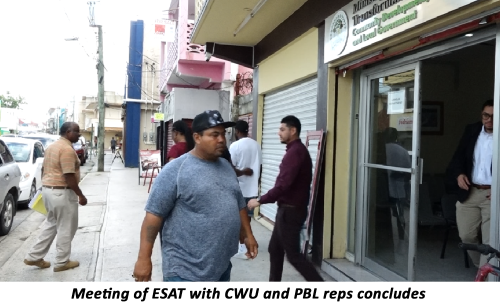Photo: CWU President Leonora Flowers
No stevedores’ strike – for now
Belize City, Wed., June 28, 2023
Three days before the Port of Belize stevedores’ 21-day notice of strike action was set to expire, the Ministry of Labour announced that it had re-established the Essential Services Arbitration Tribunal (ESAT) on June 23. This effectively precludes any intended strike action which could have started after the notice expired on June 30 if the Ministry had not acted within the 21-day period. The Tribunal will make a decision regarding any questions “as to the interpretation of the award” it had given orally in January 2022, which had included an order that the Christian Workers Union (CWU) and Port of Belize Ltd. (PBL) engage forthwith in negotiations to determine a redundancy payment due to stevedores as a result of the reduction of their earnings following the transfer of sugar-loading operations to the Port of Big Creek in July 2021.

The Tribunal has been reconvened in accordance with Section 14 of the Essential Services Arbitration Tribunal Act. At Section 14 (1) the Act states, ”Where any question arises as to the interpretation of any award of the Tribunal, the Minister or any party to the award may apply for a decision on such question and the Tribunal shall decide the matter after hearing the parties or without such hearing if the consent of the parties has been first obtained.” At Section 14 (2) it states, “The decision of the Tribunal referred to in subsection (1) shall be notified to the parties and shall be binding in the same manner as the decision in an original award.”
A first meeting of the 5-member Tribunal under this new configuration was held today, Wednesday, June 28. The ESAT is chaired by attorney-at-law, William A. Lindo. Fermin Olivera and Wilfredo Galvez are representing the Government, while Marcelo Blake is the employers’ representative, and Hubert Enriquez is the workers’ representative. The parties and their attorneys went before the Tribunal and were asked to make their submissions on the matter in writing within fourteen (14) days. The parties return thereafter for the ESAT to review the submissions, and it will then meet in early August to arrive at a decision.
After today’s meeting, which lasted about 45 minutes at the office of the Ministry of Labour off Queen Street in Belize City, CWU president, Leonora Flowers was asked whether she believes the reconvening of the Tribunal was a tactic to ensure strike action was averted. She believes that the Minister waited too long to take action. She stated, though, that they grudgingly welcome the decision to return to the Tribunal rather than the Ministry taking the position of the Minister of Labour and the Minister of Ports that the matter of enforcement needed to be decided in court. Flowers expressed hope that they can get the ESAT’s January 2022 order enforced as a result of this latest process.
After the passing of 16 months since the ESAT’s ruling, the stevedores who work at PBL have been running out of patience. Describing the new process as a circus, stevedore Bruce Diaz, who is part of the CWU stevedores’ negotiating team, walked out of the meeting and vented outside. He explained, “They just made me walk out of that meeting just now. I got upset because it was like they took me to a court all over again when the court already ruled. ‘Bruce, get your piece of cake.’ When I am going for my piece of cake, they have it in a cage and are telling me I need to go find the key to take out my cake.” He stated, “We have to come back for a clarification of a ruling that was said by the Minister and everybody was final … so now, if they cannot enforce it, wh[at] was the sense of the Tribunal on a whole?” Diaz emphasized that both parties arrived at an agreement before labour officials as witnesses in March of 2020 that there would be a redundancy payment if bulk sugar operations were taken to another port, despite a Memorandum of Understanding signed years before that prohibited such a transfer.
Attorney Darrell Bradley, who represents stevedores on the negotiating team, stressed that the union has been acting in good faith and has been going about the issue in a mature and sober way. He noted that the original March 6, 2020 agreement outlines actual timelines for negotiations to take place. As explained by Bradley, the Union is requesting that the Tribunal provide “wording and language to compel the Port of Belize to comply with the obligations which were stated in the agreement and in the Tribunal”. He further stated, “Clearly, there is a disagreement as to what the wording of the award means. The position of the Christian Workers Union is that there is no ambiguity — that the decision is actually quite clear. But what occurs is that the Port of Belize comes to the table and they just said that, ‘well, we’ve complied because we’ve looked you in the face and we’ve spoken to you.’ And we say that that is not compliance. Compliance has to be meaningful. The agreement and the Tribunal award refer to specific things, and we’re saying that these things have to be complied with; otherwise that is not compliance.”
Bradley did admit that any tribunal’s decision, whether from the Magistrate Court or High Court, is final – subject to any right of appeal. However, he added, “the reason why the Tribunal is set up is to be a comprehensive dispute mechanism body. Why is it that I would set up a tribunal and then after the tribunal finishes, I require the parties to go to court? The parties could have gone to court from the beginning and bypassed the tribunal. The idea with the tribunal is that Parliament designed a self-containing mechanism to resolve disputes and if a tribunal makes a ruling, that ruling should be complied with. And if there is no compliance, that tribunal has to have authority, inherent or expressed to make sure that they comply. Because if I then have to go to court to enforce, then what is the purpose of the tribunal?”

